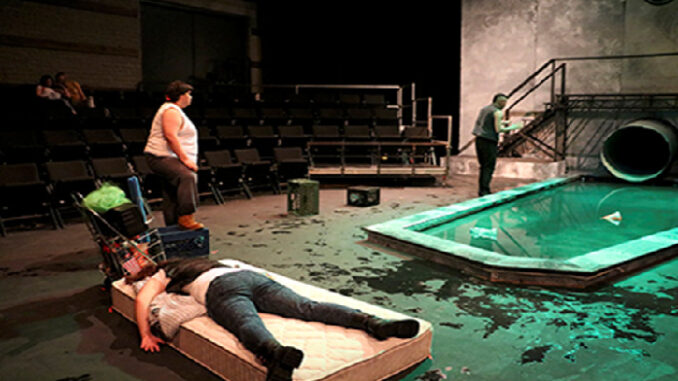
It seemed appropriate on Easter Sunday to attend Pima Community College’s Black Box Theatre production of Naomi Iizuka’s Polaroid Stories. The sparse audience was outnumbered by the cast while good people were home having Easter dinner and remembering the words of Jesus: “When you give a banquet, invite the poor, the crippled, the lame, the blind, and you will be blessed. Although they cannot repay you, you will be repaid at the resurrection of the righteous.”
They missed something special. I have not been so moved by a play in a great many years, and the cast ignored the empty seats in the 75-seat room and gave it their all. The story, a series of linked vignettes, is set in a young people’s encampment next to a Seattle sewer outlet. Homeless, hungry and hostile, these throw-away, runaway, don’t-fit-in kids share stories of their lives seeking connection, and love, always remembering that, “There are monsters here!”
I have not been homeless, but I grew up in a time of Red Scare Era fear as my father and his comrades faced trial and prison for their politics, quickly learning, as the Seattle street kids did, to mask the fear with street toughness and bravado. My eyes were tear-filled for just about all of the first act, and again at the end.
It’s a tough play, with street language, street violence, street sex, drugs, alcohol and hopelessness along with glimmers of hope, joy, beauty, songs, and even humor. We get to know ten of the possible half-million homeless youth left behind in today’s America. National estimates have found that 1.3 to 1.7 million youth experience one night of homelessness a year with 550,000 youth being homeless for a week or longer.
As usual at Pima Theatre Arts, the staging and lighting (Todd Poelstra and Anthony Richards) is flawless and the set amazing. Director Marc David Pinate clearly succeeded in his goal of pulling the student actors’ own experiences out to be “vulnerable and honest experiences on stage…getting to the truth.”
The cast is strong, especially Adrian Hinojos, who serves as the connecting person, and Veronica Conran, who convinced me she may well be one of Seattle’s tough street youth. Izzy Georgiaes, Rene Gallego, Evan Taylor, Vauxn Mcquillen, Shalin Allen, Saun’ Rae Nez, Taylor Hernandez and Brandon Saxon make up the rest of the cast and can take pride in their achievements.
[metaslider id=65385]
Pima Community College’s Theatre Arts Department is an unsung local treasure that deserves more support than just buying tickets for their annual, and always fabulous., musicals. Choosing difficult and edgy plays like Polaroid Stories along with traditional theatre expands both the students’ horizons, and our own theatre-going experiences. There are performances of Polaroid Stories Thursday, Friday and Saturday evening (April 25-26-27) and a final Sunday matinee at 2 p.m. on April 28. Tickets are $17; $10 for Pima students, online or at the Box Office (12-5, Tuesday-Friday), and an hour before performances.
This is the last production for the season. Next season promises to be just as exciting, with a bilingual The Sun Serpent opening in September, followed by the comedy Baskerville: A Sherlock Holmes Mystery, the hit musical Singin’ In The Rain, and Shakespeare’s As You Like It. Give yourself a real treat and see them all.
